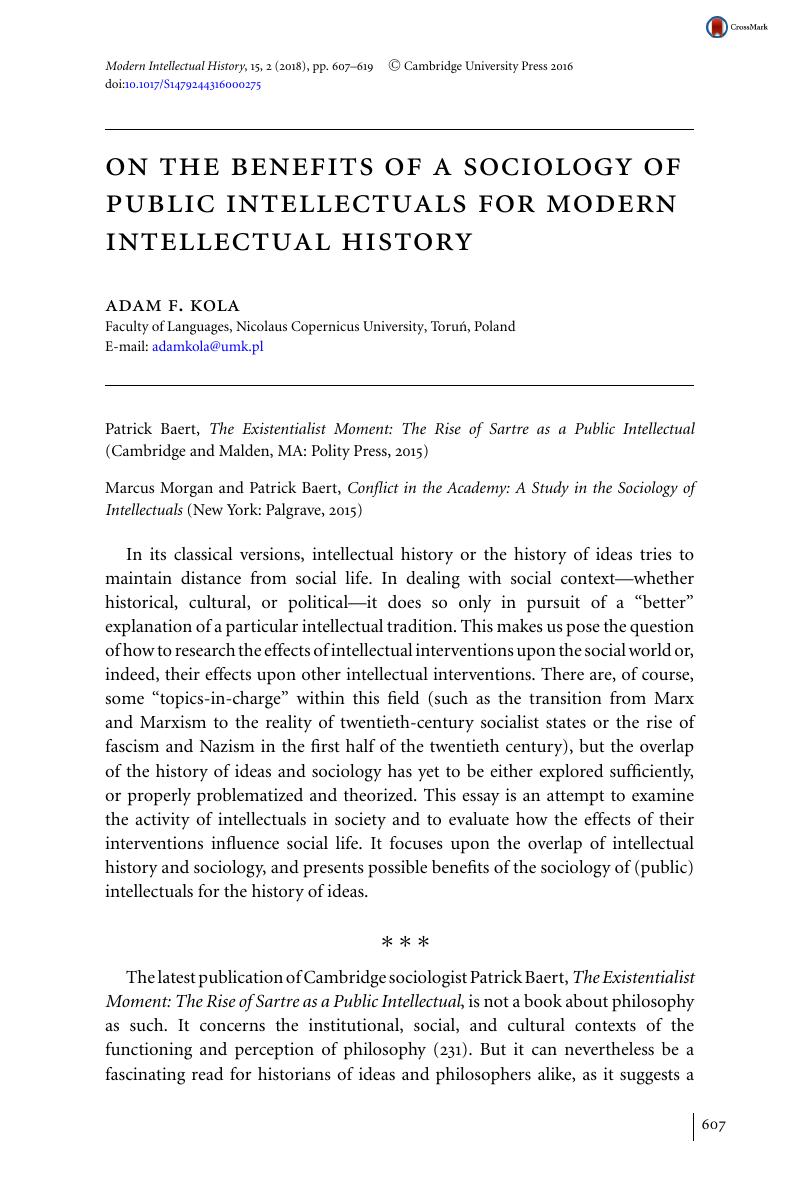No CrossRef data available.
Article contents
ON THE BENEFITS OF A SOCIOLOGY OF PUBLIC INTELLECTUALS FOR MODERN INTELLECTUAL HISTORY
Review products
Published online by Cambridge University Press: 22 September 2016
Abstract

- Type
- Review Essays
- Information
- Copyright
- Copyright © Cambridge University Press 2016
References
1 Collins, Randall, The Sociology of Philosophies: A Global Theory of Intellectual Change (Cambridge, MA and London, 2002)Google Scholar. I would add to this—except mentioned below—further important works by Fabiani, Jean-Louis, especially Qu'est-ce qu'un philosophe français? La vie sociale des concepts (1880–1980) (Paris, 2010)CrossRefGoogle Scholar; and—for different reasons—La sociologie comme elle s’écrit: De Bourdieu à Latour (Paris, 2015). On the state of French intellectual history see Lilti, Antoine, “Does Intellectual History Exist in France? The Chronicle of a Renaissance Foretold”, in McMahon, Darrin M. and Moyn, Samuel, eds., Rethinking Modern European Intellectual History (Oxford and New York, 2014), 56–73CrossRefGoogle Scholar.
2 Judt, Tony, Past Imperfect: French Intellectuals, 1944–1956 (New York and London, 2011)Google Scholar; Boschetti, Anna, Sartre et ‘Les temps modernes’ (Paris, 1985)Google Scholar.
3 Lamont, Michèle, “How to Become a Dominant French Philosopher: The Case of Jacques Derrida,” American Journal of Sociology, 93/3 (1987), 584–622.CrossRefGoogle Scholar
4 Judt, Past Imperfect.
5 Buruma, Ian, Year Zero: A History of 1945 (New York, 2013)Google Scholar; Lowe, Keith, Savage Continent: Europe in the Aftermath of World War II (New York, 2012)Google Scholar.
6 Mandler, Peter, Return from the Natives: How Margaret Mead Won the Second World War and Lost the Cold War (New Haven and London, 2013)CrossRefGoogle Scholar; Isaac, Joel and Bell, Duncan, Uncertain Empire: American History and the Idea of the Cold War (Oxford and New York, 2012)Google Scholar; Solovey, Mark and Cravens, Hamilton, Cold War Social Science: Knowledge Production, Liberal Democracy, and Human Nature (New York, 2012)CrossRefGoogle Scholar; Cohen-Cole, Jamie, The Open Mind: Cold War and the Science of Human Nature (Chicago and London, 2014)Google Scholar; Isaac, Joel, Working Knowledge: Making the Human Science from Parson to Kuhn (Cambridge, MA and London, 2012)CrossRefGoogle Scholar; Jewett, Andrew, Science, Democracy, and the American University: From the Civil War to the Cold War (Cambridge, 2014)Google Scholar. It is symptomatic that two of the titles touch on the question of human nature.
7 See also Isaac and Bell, Uncertain Empire.
8 Boschetti, Sartre.
9 Collins, The Sociology of Philosophies, 754–84.
10 Latour, Bruno, Reassembling the Social: An Introduction to Actor-Network Theory (Oxford, 2005)Google Scholar.
11 Felski, Rita, “Context Stinks!”, New Literary History, 42/4 (2011), 573–91CrossRefGoogle Scholar. The author refers to Latour, Reassembling the Social, 148.
12 Quentin Skinner, “Truth, Belief and Interpretation” (manuscript).
13 That is probably the reason why Baert does not take into account e.g. Dominick LaCapra's classical study A Preface to Sartre (Ithaca, 1978).
14 Whatmore, Richard, What Is Intellectual History? (Cambridge, 2016), 45–57.Google Scholar
15 Moyn, Samuel and Sartori, Andrew, eds., Global Intellectual History (New York, 2013)CrossRefGoogle Scholar; McMahon and Moyn, Rethinking Modern European Intellectual History.
16 Baert, Patrick, “The Power Struggles of French Intellectuals at the End of the Second World War: A Study in the Sociology of Ideas,” European Journal of Social Theory, 14/4 (2011), 415–35;CrossRefGoogle Scholar Baert, Patrick and Booth, Josh, “Tensions within the Public Intellectual: Political Interventions from Dreyfus to the New Social Media,” International Journal of Politics, Culture, and Society, 25/4 (2012), 111–26;CrossRefGoogle Scholar Baert, Patrick and Dominguez Rubio, Fernando, eds., The Politics of Knowledge (London, 2012)Google Scholar; Medina, Leandro Rodriguez and Baert, Patrick, “Local Chairs vs International Networks: The Beginning of the Scholarly Career in a Peripheral Academic Field,” International Journal of Politics, Culture and Society, 27/1 (2013), 93–114CrossRefGoogle Scholar.
17 Skinner, Quentin, “Meaning and Understanding in the History of Ideas,” History and Theory, 8/1 (1969), 3–53, at 45–6CrossRefGoogle Scholar. See also Whatmore, What Is Intellectual History?, 44–57. Austin, John L., How to Do Things with Words (Oxford, 1975)CrossRefGoogle Scholar.
18 Skinner, “Truth, Belief and Interpretation.”





